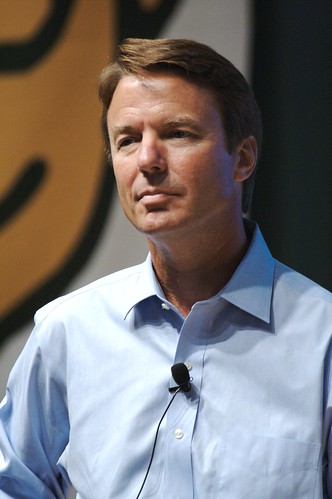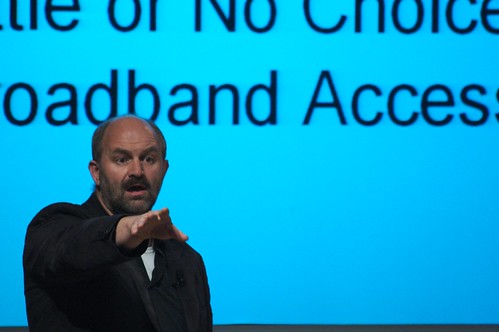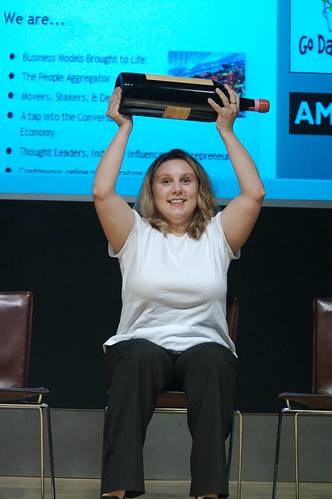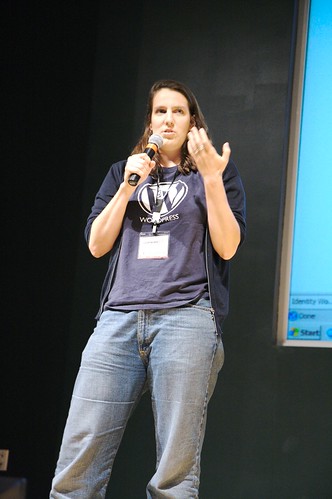Ted Leung on the air: Open Source, Java, Python, and ...
When Chris and Ponzi asked if I would take photographs of Gnomedex for them, I had about the same reaction that as if someone asked me to photograph their wedding: "Are you sure"?! Doing a good job of photographing a conference is hard work, and having watched my friend James Duncan Davidson do it, I know how much work it is, and the level of pictures that someone like James is producing. In the end, they assured me that they were not looking for "O'Reilly quality" photographs, and I promised them that I would do my best. Here's my Flickr set for Gnomedex 6.0, which contains (what I think) are the best of the photographs that I took.
It's a very different experience to be just running around a conference with a camera, and being on the hook to try and really record what is going on. You don't want to miss anything, and you want to make sure that the photos that you take don't portray people in an unflattering light. Practically, this means lots of running around and moving round the room to try to get different angles and magnifications of people. During the course of the pre-party and the two days of Gnomedex, I shot a total of 1578 frames, and by the end of the show, I was totally pooped out. It turns out that camera equipment is heavy if it is in your hand all day.
Of course, there are also benefits. If you are walking around with a "big camera", along with an external flash, and a monopod, people are very accomodating. Lots of people stopped to let me get a shot, I leaned over many desks, stood on chairs and countertops, and no one said a word. I also got access to some things that other people didn't like private photo ops with John Edwards in the green room.
There was also a fun community thing that happened. It turned out that one of the best places to shoot was right down in front, in the aisle. That spot turned into a little hangout for the photo crazies at Gnomedex. Scott Beale, who I finally met in person, wisely set up his base camp right in the front row, so he had a seat and full access to his computer. Kris Krug was down there often, although sometimes it felt lik he was spending more time shooting me than shooting the stage. Dan Farber also came down quite a number of times to grab some shots.
A couple of anecdotes from the photographer's view. When Edwards came out on stage, there was a huge burst of flashes. The burst was very visible from where I was in the front row. After that died down, people in the front row were probably deafened by the sound of Scott, Kris, me, and the official Seattle PI photographer. It was click, click, click, click. It was pretty funny.
Ironically, the most likely to be remembered shot was not taken by Kris, Scott, or me. When Chris went into his Michael Jackson routine, all of us were using fairly long lenses, and focusing in just on Chris. I don't know about Scott or Kris, but I couldn't see the "Think Small" text on the screen behind Chris. But Josh Bancroft saw it, and he got the shot and piped it up via his EVDO connection. Just goes to show that it's not the equipement that makes the shot. I'd guess that Josh is pretty glad that he "caved" and got a new camera.
For Speakers
James has already written a great essay giving speakers tips on being photographed well. I would add a few more things.
- Move away from the podium - being stuck behind the podium seriously reduces the number of decent looking angles that a photographer can use.
- Don't move too fast - conferences are held in dark rooms, and the cameras stretched really far.
- Take your hands out of your pockets - It is really hard to make you look good when your hands are in your pockets.
At Gnomedex there were a few speakers who were just exceptionally easy to photograph. For those speakers, I had lots of great shots - it made it hard to pick just one. For speakers at the other end, even though I shot many pictures, it was really hard to get even one shot that was flattering.
For photo geeks
When you shoot 1500 frames, post-processing and flickring them become an issue. I ripped out an enormous number of shots -- I shot an entire 1GB card (110 RAW frames) of John Edwards alone. I think that there is something that needs to improve in my technique, because I've watched James and he clicks a lot, but I don't think he's clicking as much as I am. Seems like I am using brute force to solve the problem here. Everything about this experience has given me even more respect for James than I already had.
As far as post processing goes, Aperture got the nod, and did admirably. I am pretty sure that there are still a few ways that I can streamline my workflow, but I was mostly happy. The only source of unhappiness has to do with the way that versions and ratings interact. I created an new Aperture project with sub albums for each day of Gnomedex (if there's a next time, parties get their own albums too). Then I used ratings to help me get to the set of pictures that I was going to post. The problem is that sometimes there were pictures that needed an adjustment before I could tell whether they'd move to the next level. I discovered that when you create a new version, the ratings aren't coupled between the versions, at least when you are working in an album. In any case, this needs some serious manual reading to get to the bottom of it.
I've been using the Yahoo/Flickr uploader since I switched to Aperture. Oh how I miss Fraser Speir's IPhoto Flickr Export! One night I had the Flickr uploader crashing all over the place on me. I think it has something to do with the program not being native for Intel, or the PPC emulator getting confused. It caused major pain. Here are some features that the ideal uploader would have:
- Be Universal
- Be fast
- Allow me to arrange the pictures into the order they will appear, even if I add new pictures (before I upload the batch)
- Setting the title and description and licensing as a batch operation
- Description "footers' so you could do things like "Attribute to Ted Leung"
- Let me navigate with a keyboard
- Complete tags using my tag set from flickr
- Upload on a schedule and in batches. A few people that I talked to just hooked their cameras up and uploaded the entire contents of their memory cards, which buries everyone who came before. I'd like to see a way for me to upload a big batch in smaller chunks and spread out over a period of time -- but I want to set that all up at once and then walk away from the computer
Thanks again to Chris and Ponzi for the opportunity to do this. I'm glad to see that people are using the shots.

This year Chris and Ponzi asked me to shoot some pictures during Gnomedex 6.0, so I spent a lot of Gnomedex running around with a camera in my hand. This post is the usual roundup of impressions of the conference. I'm going to write a second post about the photography experience.
The appearance of John Edwards was one of the big deals of the show, hitting the front page of the Seattle Post Intelligencer over the weekend.
Senator Edwards
Lots of people seemed focused on whether or not Edwards was "their" candidate or not, and on whether or not he got it. Edwards got lots of props for admitting that it was very hard for him (and other politicians) to break out of the guarded facade that has been the standard for politicians for many years. I think that the public also has to break out of its old way of relating to and viewing politicians. Before Edwards arrived, Chris Pirillo pled with the audience to use this as an appearance as an opportunity to help Edwards learn about "us", the technology world and so forth. I was struck by how a conference full of bloggers slipped right into treating Edwards as a political expert and peppering him with questions about his positions. Since I was shooting the show for Chris, I got the chance to be in the green room with Chris, Ponzi, and Edwards both before and after Edwards went on stage. Afterwards, Chris was apologizing to Edwards because the discussion ended up being much more political and less of the educating that Chris was hoping for. Edwards turned to Chris and said "You know, you just can't stop them from asking the political questions". It seems that the public is as programmed as the politicians. Somehow we need a way to break the cycle.
Amazon CTO Werner Vogels
I found Werner Vogel's session on Network Neutrality to be very informative. It was personally useful to me to get a good summarization and overview of the state of the debate. He cited the Wikipedia entry as a good reference for those interested in tunneling deeper.
Bloglines gave Big Wine for Big Ideas
The juxtaposition of the Bloglines Big Ideas session with Steve Gillmor's Attention session was quite amusing. The winner of the Blog Ideas session was the idea that an aggregator should figure out what you are interested and help filter out the stuff that you aren't. I'd call that an attention+reputation based aggregator, but that's just me. Gillmor announced the "Attention Operating System" - the product of a venture between GestureBank and root.net. This is something I'm going to be keeping my eye on.
An interesting thing that Dave Winer said during his session was something to the effect that manufacturing companies are going to be come outsourced services to make stuff for people that have ideas. I think that this meshes very well with the themes that Eric von Hippel has been writing about in Democratizing Innovation
Kaliya Hamlin, Identity Woman
Kaliya Hamlin (Identity Woman) did a great impromptu session on the gap between the civil society (users) and the social tool building sector (developers). One of the efforts that she mentioned was the Interra project. Kaliya's profile has been rising recently and with good reason. It was good to see Dave Winer and Marc Canter vocally supporting her as the discussion leader. Gnomedex MVP indeed.
There was a much publicized confrontation between Dave Winer and Blake Ross, which seems to be on its way to a resolution. I'm happy that there was a resolution, but as I watched the incident there was one thing which really surprised me. Both Dave and Steve Gillmor chastised Blake (and the Firefox project) for being non-transparent, particularly with respect to product plans. The thing that surprised me is that both Dave and Steve are very savvy, and yet they seemed unaware that the product plans for Firefox are up on a public wiki, that the development is coordinated via public newsgroups and so forth. If people like Dave and Steve think that product plan information is secret the way that it is in proprietary software companies, then we in the open source community as a whole need to really rethink how we are communicating with users.
Chris did a session with some VC's where he pitched them on TagJag in front of all of Gnomedex. I though that this was a pretty educational session for people interested in getting a project funded. Jeff Clavier has more on what happened.
In addition to the zillion posts in the blogosphere, you can also see the notes that the indJet folks were taking with Mind Manager. So far only the day 1 notes are up.
This the first conference that I've attended using the official unconference format (Gnomedex used the regular speaker format last year). Werner Vogels wrote:
Beyond this the conferences that focus on participation are best served by the Open Space approach. I don’t think the “unconference” hybrid model is as effective as Open Space. Unconferences still rely on big names and predefined topics to restrict the conversation. In Open Space all the participants come together on the first day to define the topics to be discussed and anyone can propose a topic within the theme of the conference. Participants then go to take part in the discussions they are most passionate about. There is some additional structure around the process to make sure everyone learns about the details of every topic that was discussed. The outcome depends a lot on the theme or the goals of the conference, but in general I have found that the participants feel extremely empowered by this approach.
The goal of Open Space is to make the whole conference one long coffee break …
I definitely agree with this, and Ethan Kaplan made note of the asymmetrical nature of the format during his session (I wasn't wowed by Ethan's session, but there's a lot of good stuff in his Gnomedex wrapup). For me it was still the case that the very best parts of Gnomedex were single person or small group interactions that I had with people during the parties or in the hallways.
One of those great conversations was with Philip Pearson, whose blog I've been reading for years, and who is now working on Marc Canter's People Aggregator. Philip just put up a post discussing the details of the People Aggregator API.













